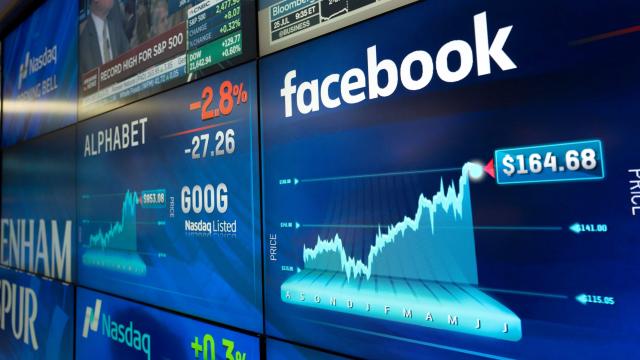Facebook’s Cambridge Analytica scandal, in which the social media giant gave access to the data of up to 87 million users to an app partnered with an ultra-sketchy election data firm, still isn’t totally resolved, with news breaking this week investigators from four agencies are looking into Facebook’s conduct. But all the negative attention the site has received this year has apparently failed to blunt its momentum.
Per CNBC, Facebook stock bumped five per cent on Friday to an “all-time intraday high of $US203.64 ($274) a share,” closing at a record $US203.23 ($274)—“a market value of more than $US588 ($791) billion.”
CEO Mark Zuckerberg has become even richer as a result, CNBC added:
Zuckerberg now sits in fourth place on the Bloomberg Billionaires Index just behind Warren Buffett. Around market close, the tech executive briefly passed the Berkshire Hathaway billionaire.
Bloomberg estimates the Zuckerberg is now worth $US79.7 ($107) billion. He is ranked as the fifth wealthiest person in the world on Forbes’ list, just behind LVMH CEO Bernard Arnault. Forbes estimates that Zuckerberg is worth about $US77.1 ($104) billion.
Earlier this year, the company posted better than expected first-quarter earnings, reporting it had 1.45 billion daily active users and 2.2 billion monthly active users.
That Facebook continues to get richer despite the Cambridge Analytica scandal only underscores the stranglehold it has on much of the internet. As noted by AdWeek, Facebook and its subsidiaries like Instagram continue to maintain an online advertising duopoly with Google that sucks up over 60 per cent of all digital ad dollars and that duopoly is very profitable.
Instagram is still being monetized and could generate even more revenue in the future. Its potential to continue expanding in foreign markets is massive.
Shares dipped as low as $US149.02 ($201) when the scandal was at its peak, CNBC noted, but Facebook’s responses to it and separate allegations the platform has become rife with misinformation and propaganda have competed with its obvious desire to move on.
The Cambridge Analytica incident as well as evidence Facebook was used for election meddling purposes in 2016 were hugely embarrassing for the company and exposed some of its less savoury inner workings, but may have only had marginal effects on the core business. According to Yahoo Finance, some analysts have concluded that Facebook users simply do not care all that much about the company’s periodic privacy scandals:
BTIG analyst Richard Greenfield raised his Facebook price target from $US175 ($236) to $US275 ($370), which marked a roughly 43% upside from Tuesday’s closing price of $US192.73 ($259) per share
… Furthermore, Greenfield was upbeat about Facebook’s flagship social media platform and noted that users “simply could not care less” about the nearly non-stop flurry of negative news surrounding the company this year. “We continue to view Facebook as a must-own stock to maintain exposure to growth of mobile time spent,” Greenfield wrote.
As noted earlier this year by Fast Company, consumers indeed claim to care about privacy, but seem to ultimately understand that much of the information they put on Facebook is public. That is one likely reason news that said data ended up in the hands of parties unknown—or is being used for advertising purposes—has not driven people away from the site in droves.
The tradeoff isn’t worth it for many, given that Facebook is so tightly integrated into users’ lives that leaving the site is a difficult decision.
Marketers, of course, simply don’t care as long as they can reach millions of users.
In any case, even as people are becoming more sceptical of Facebook’s policies and motives than ever, the site continues to operate as a giant money spigot. It doesn’t appear to be about to turn off anytime soon.
[CNBC]
